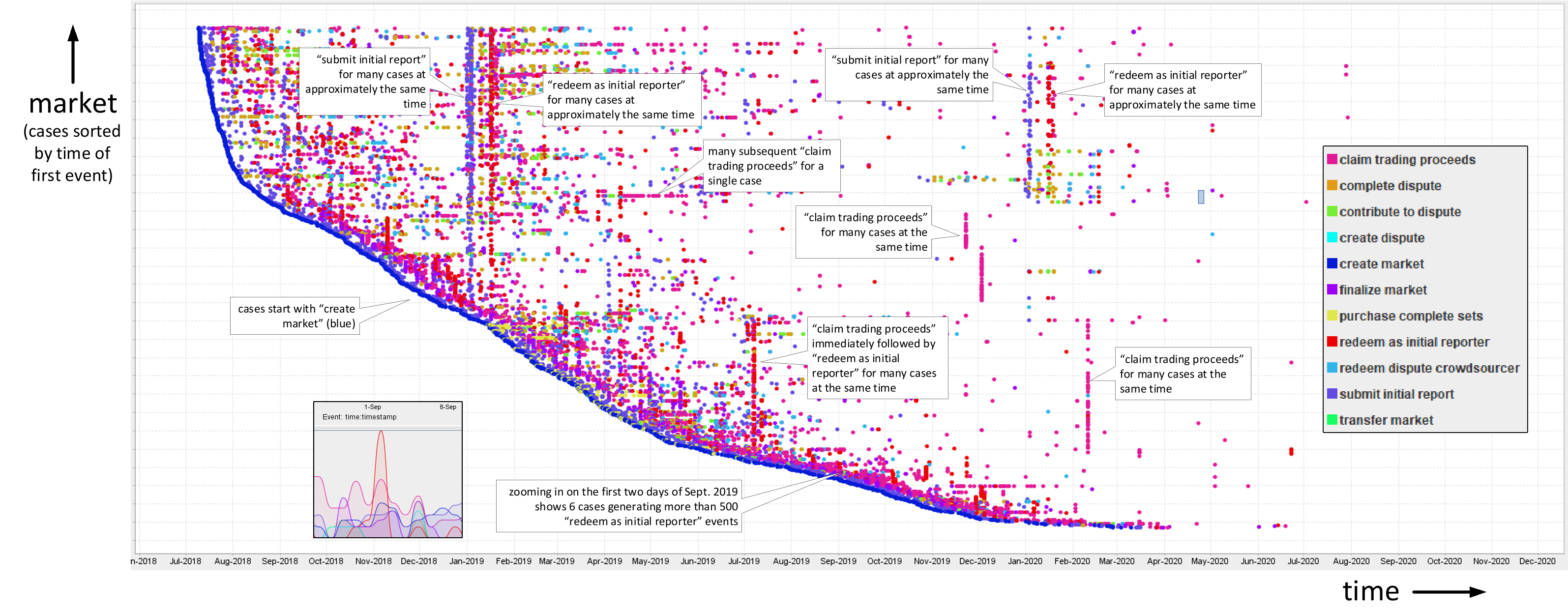1 Augur
- DApp Homepage: https://augur.net
- DApp Source Code: https://github.com/AugurProject/augur-core
- ELF Script: Augur.ethql
- Event Log: Augur.xes
- Process: Augur.bpmn
- Object-centric Event Log: Augur.csv
Augur is a betting platform and prediction marketplace that is implemented as a set of smart contracts on the public Ethereum blockchain. Augur’s white paper characterizes the mechanics of a prediction and betting market: “individuals can speculate on the outcomes of future events; those who forecast the outcome correctly win money, and those who forecast incorrectly lose money.” As a betting market organized on Ethereum, the developers claim that Augur bypasses disadvantages of traditional betting markets, such as trusted market operator and limited participation.
1.1 Data Overview
Each trace in the Augur log captures the events that occur in relation to a specific betting market. Each trace has the following attributes:
marketType(xs:string) - The type of the market: yes/no-markets deal with binary questions, while categorical and scalar markets expect discrete and numeric answersdescription(xs:string) - A description of the bet or question that is askedextraInfo(xs:string) - Additional information about the bet or questionminPrice(xs:int) - The minimum price for the answermaxPrice(xs:int) - The maximum price for the answer
In addition, each event has a set of standard attributes:
concept:name(xs:string) - The class of the eventtime:timestamp(xs:date) - The timestamp of the block that included the eventlifecycle:transition(xs:string) - The lifecycle transition of each event, for all events set toCompletedby default. This attribute exists to ensure compatibility with XES-certified toolsblockNumber(xs:int) - The number of the block that included the eventrequester(xs:string) - The address of the transaction senderreceivingContract(xs:string) - The address of the transaction recipient (typically of an Augur contract)txIndex(xs:int) - The index of the transaction that included the eventtxHash(xs:string) - The hash of the transaction that included the eventtxSuccessful(xs:boolean) - A flag indicated whether the transaction was successfully executedlogRemoved(xs:boolean) - A flag indicated whether the log was removedgas(xs:int) - The amount of gas set as the gas limit by the transaction requestergasUsed(xs:int) - The amount of gas that was consumed by the transactiongasPaid(xs:int) - The amount of Ether that was paid for the execution of the transactiongasPrice(xs:int) - The gas price set by the transaction senderuniverse(xs:string) - The address of the Augur instance in which the event occurred
The following events can occur during a market’s lifetime:
- create market - The betting market is initialized
creator(xs:string) - The address of the market creatorcreationFee(xs:int) - The price paid for the creation of the market
- submit initial report - An initial answer for the betting market is submitted
reporter(xs:string) - The address of the reporter providing the answeramountStaked(xs:int) - The amount of reputation token owned by the reporterisDesignatedReporter(xs:boolean) - A flag indicating whether the reporter was the initally assigned reporterinvalid(xs:boolean) - A flag indicating whether the answer was flagged as INVALID by the reporter
- purchase complete sets - A user invests in an anticipated answer
account(xs:string) - The address of the user who buys sharesnumCompleteSets(xs:int) - The number of shares that are bought
- create dispute - A discussion about a provided answer is started
disputeCrowdsourcer(xs:string) - The address of the user who creates the disputesize(xs:int) - The amount of reputation token owned by the reporterinvalid(xs:boolean) - A flag indicating whether the answer was flagged as INVALID by the reporter
- contribute to dispute - A user adds to a discussion about a provided answer
reporter(xs:string) - The address of the user who contributes to the answerdisputeCrowdsourcer(xs:string) - The address of the user who is targeted in the disputeamountStaked(xs:int) - The amount of staked reputation
- redeem dispute crowdsourcer - A user tries to obtain his or her revenue from the dispute
reporter(xs:string) - The address of the userdisputeCrowdsourcer(xs:string) - The address of the user initiating the transactionamountRedeemed(xs:int) - The amount of redeemed EtherrepReceived(xs:int) - The amount of received reputationreportingFeesReceived(xs:int) - The amount of received reporting fees
- complete dispute - A discussion about a provided answer is closed
disputeCrowdsourceras xs:string disputeCrowdsourcer,
- finalize market - The betting market is closed
- claim trading proceeds - A user tries to obtain his or her revenue from the investment into an answer
shareToken(xs:string) - The address of the share tokensender(xs:string) - The address of the usernumShares(xs:int) - The number of claimed sharesnumPayoutTokens(xs:int) - The number of shares that the user ownsfinalTokenBalance(xs:int) - The share balance of the user after the update
- redeem as initial reporter - A user tries to obtain his or her revenue for providing the initial answer
reporter(xs:string) - The address of the reporteramountRedeemed(xs:int) - The amount of redeemed EtherrepReceived(xs:int) - The amount of redeemed ReputationreportingFeesReceived(xs:int) - The amount of redeemed reporting fees
- transfer market - The betting market is transferred from one to another user
from(xs:string) - The address of the previous market ownerto(xs:string) - The address of the new market owner
1.2 Preliminary Analysis
We conducted a case study on process mining for data extracted from Augur in [1, 2]. To this end, we used process mining methods and tools to explore the data, discover models for a set of variants, and conduct conformance checking and performance analyses.

The dotted chart shows different time intervals of increased activity and activity batches that were triggered within a short time frame.

Using conformance checking, we found that the implementation diverged from the documented architecture of the DApp and identified interesting deviations from the normative process.

An interview with the chief architect of Augur validated our insights and more generally confirmed the usefulness of such insights for DApp development.
References
[1] R. Hobeck, C. Klinkmüller, H.M.N.D. Bandara, I. Weber and W. van der Aalst (2021): “Process Mining on Blockchain Data: A Case Study of Augur”. In: International Conference on Business Process Management.
[2] R. Hobeck, C. Klinkmüller, D. HMN Bandara, I. Weber and W. van der Aalst (2024): “On the Suitability of Process Mining for Enhancing Transparency of Blockchain Applications”. Bus Inf Syst Eng.